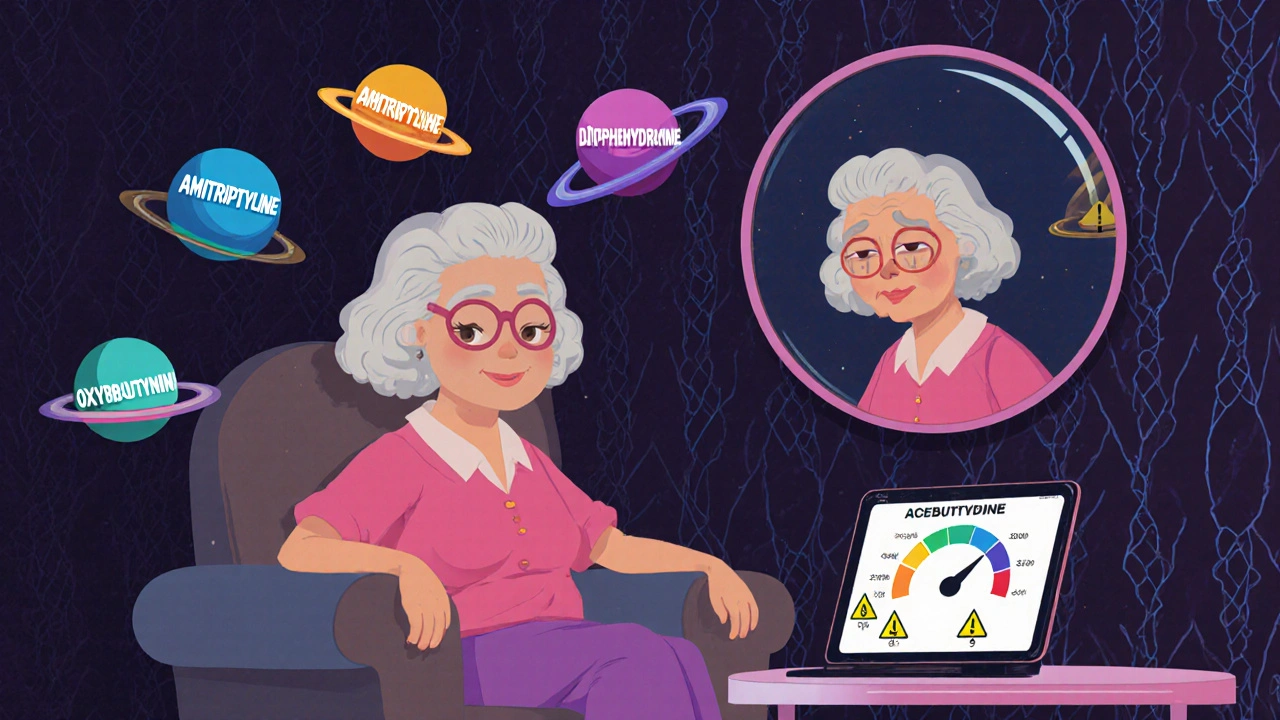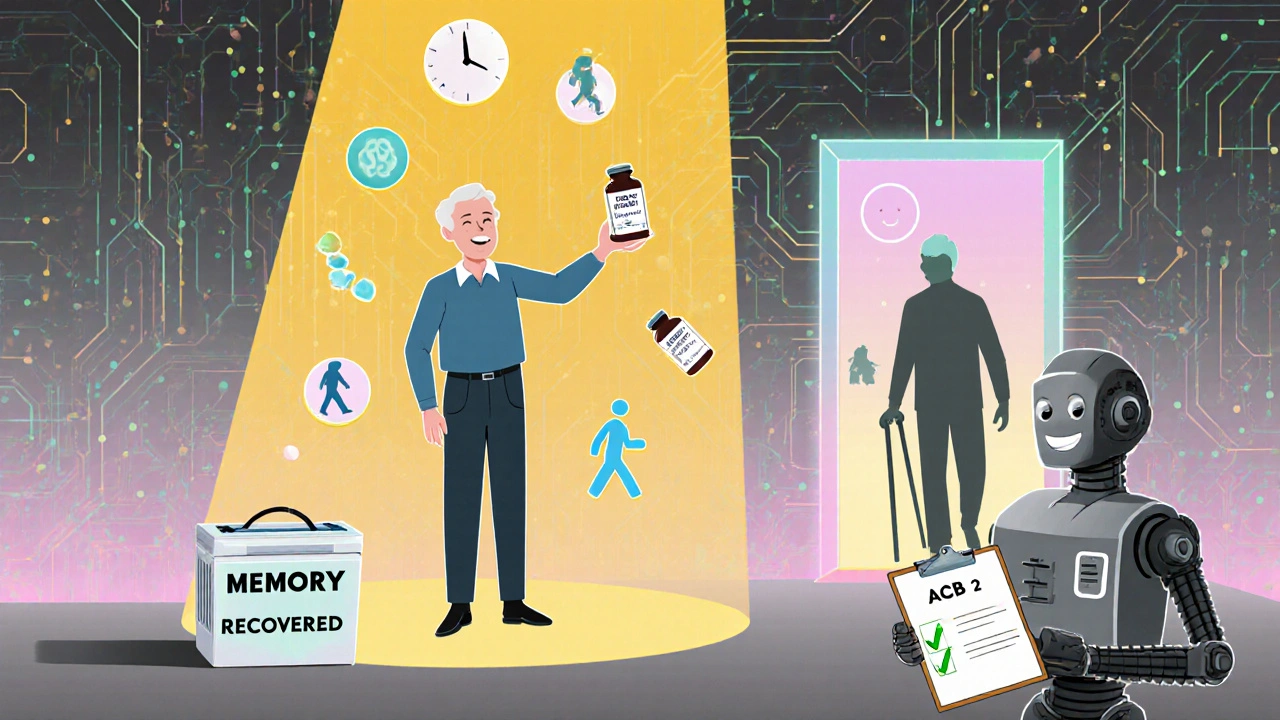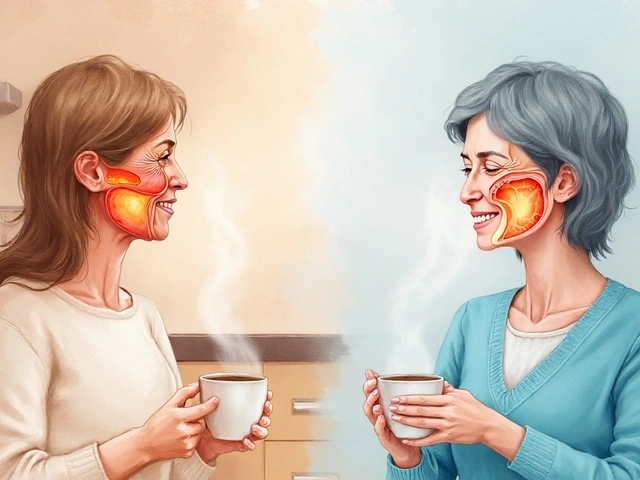
Every year, thousands of older adults are misdiagnosed with dementia-not because their brains are failing, but because they’re taking a nightly sleep aid that’s been on pharmacy shelves for decades. That sleep aid? Diphenhydramine, the active ingredient in Benadryl. It’s cheap, easy to find, and often taken without a second thought. But when combined with other common medications-like bladder pills, antidepressants, or even heartburn drugs-it can push the body into a dangerous state called cumulative anticholinergic burden.
What Is Cumulative Anticholinergic Burden?
Your body uses acetylcholine to send signals between nerves and muscles. It helps you remember things, move smoothly, digest food, and even control your bladder. Anticholinergic drugs block this chemical. That’s why they work for allergies, motion sickness, overactive bladder, and insomnia. But when you take more than one of these drugs-or take one for months or years-their effects add up. That’s cumulative anticholinergic burden. It’s not just about one pill. It’s about the total load your nervous system carries from all the medications you’re using. The most widely used tool to measure this is the Anticholinergic Burden (ACB) Scale. It rates each medication from 0 to 3:- Score 0: No anticholinergic effect (like loratadine or cetirizine)
- Score 1: Mild effect (some diuretics, certain antidepressants)
- Score 2-3: Strong effect (diphenhydramine, chlorpheniramine, amitriptyline, oxybutynin)
Why First-Generation Antihistamines Are the Hidden Culprit
Not all antihistamines are the same. Second-generation ones like Claritin (loratadine), Zyrtec (cetirizine), and Allegra (fexofenadine) barely touch acetylcholine. They’re designed to treat allergies without making you sleepy or foggy. But first-generation antihistamines-diphenhydramine, chlorpheniramine, hydroxyzine-cross into the brain and block acetylcholine aggressively. That’s why they make you drowsy. That’s also why they’re so dangerous over time. These drugs are everywhere:- Benadryl for allergies
- Unisom for sleep
- Dimetapp for colds
- Many generic night-time pain relievers
How Medications Stack Up: A Real-World Example
Imagine a 72-year-old woman taking:- Diphenhydramine 25 mg at night for sleep → ACB 3
- Amitriptyline 25 mg for nerve pain → ACB 3
- Oxybutynin 5 mg for overactive bladder → ACB 3
Who’s Most at Risk?
The risk isn’t equal for everyone. People over 65 are most vulnerable because:- Their bodies process drugs slower
- They’re more likely to take multiple medications
- Their brains are more sensitive to acetylcholine disruption

What You Might Not Realize About Over-the-Counter Drugs
Here’s the biggest blind spot: 70% of strong anticholinergic drugs are sold without a prescription. That means your doctor doesn’t always know you’re taking them. A 2022 survey on AgingCare.com found that 68% of older adults had been using diphenhydramine for sleep for over a year. Only 12% had been warned about side effects. One user wrote: “My doctor never mentioned that allergy pills could cause memory problems.” It’s not just sleep aids. Many cold and flu products contain diphenhydramine or chlorpheniramine. People take them for a few days during a cold, then keep them on the shelf-and reach for them again when they can’t sleep, or when their allergies flare up. That’s how the burden builds quietly, over months and years.How to Check Your Own Burden
You don’t need a fancy test. You just need to know what you’re taking. Start by listing every pill, patch, or liquid you use daily or weekly. Include:- Prescription drugs
- Over-the-counter meds
- Herbal supplements
- Vitamins with sleep aids (like melatonin with diphenhydramine)
What to Do If Your Score Is High
Don’t stop anything cold turkey. Talk to your doctor or pharmacist. Here’s how to safely reduce your burden:- Swap first-gen antihistamines for second-gen: Use loratadine or cetirizine instead of diphenhydramine.
- Replace sleep aids: Try melatonin, cognitive behavioral therapy for insomnia (CBT-I), or better sleep hygiene instead of Benadryl.
- Ask about alternatives: For bladder issues, ask if mirabegron (Myrbetriq) is an option instead of oxybutynin. For pain, ask about gabapentin instead of amitriptyline.
- Use the “start low, go slow” rule: If you must take an anticholinergic, use the lowest dose for the shortest time.

Why This Matters Beyond Memory
It’s not just about dementia. High anticholinergic burden increases your risk of:- Falls and fractures
- Urinary retention leading to infections
- Constipation and bowel obstruction
- Heart rhythm problems
- Delirium during hospital stays
What’s Changing in 2025
Hospitals and clinics are waking up. In the U.S., Medicare Advantage plans now get better ratings if they reduce anticholinergic prescribing. Electronic health records are being updated to flag high ACB scores automatically. By 2027, 80% of healthcare systems plan to screen everyone over 65 for anticholinergic burden during routine visits. That’s a big shift. But until then, the responsibility falls on you. If you’re taking any antihistamine regularly, ask: Is this helping me-or quietly hurting me?What You Can Do Today
1. Look at your medicine cabinet. Find anything with diphenhydramine, chlorpheniramine, or hydroxyzine. 2. Write down every medication you take, even if you think it’s harmless. 3. Ask your pharmacist: “Do any of these have anticholinergic effects?” They’re trained to spot this. 4. Ask your doctor: “Is there a safer alternative for this?” You don’t need to be a medical expert to protect yourself. You just need to ask the right questions.One woman in Perth told her doctor she’d been taking Benadryl every night for 12 years. She thought it was just helping her sleep. After switching to melatonin and stopping the antihistamine, her memory cleared up. Her family said she was “like her old self again.” That’s not magic. That’s reversing damage.
Medications aren’t harmless. Especially when they stack up. Your brain doesn’t forget what it’s been exposed to. But it can heal-if you stop the exposure.
Can over-the-counter antihistamines really cause memory loss?
Yes. First-generation antihistamines like diphenhydramine and chlorpheniramine strongly block acetylcholine in the brain. Long-term use, especially when combined with other anticholinergic drugs, is linked to cognitive decline and a 54% higher risk of dementia, according to a 7-year JAMA study of over 3,400 adults. The effect builds over time-even if you only take one pill a night.
Are second-generation antihistamines like Claritin safe for older adults?
Yes. Loratadine (Claritin), cetirizine (Zyrtec), and fexofenadine (Allegra) have little to no anticholinergic effect (ACB score of 0-1). They treat allergies without causing drowsiness, confusion, or memory problems. They’re the recommended choice for older adults instead of Benadryl or similar products.
How do I know if my medication has anticholinergic effects?
Check the active ingredient. If it’s diphenhydramine, chlorpheniramine, hydroxyzine, or promethazine, it’s strongly anticholinergic. For prescription drugs, look for amitriptyline, oxybutynin, tolterodine, or benztropine. You can also use the free ACB Scale tool from the IU Center for Aging Research or ask your pharmacist to review your list.
Can stopping anticholinergics improve memory?
Yes. Multiple case studies show that when older adults stop high-burden anticholinergics like diphenhydramine or amitriptyline, their memory, alertness, and balance improve within weeks. One patient’s ACB score dropped from 5 to 2 after switching sleep aids, and her falls decreased by 75%. Recovery isn’t guaranteed for everyone, but it’s common-and often dramatic.
What should I use instead of Benadryl for sleep?
Try melatonin (3 mg at bedtime), cognitive behavioral therapy for insomnia (CBT-I), or improving sleep habits-like avoiding screens before bed, keeping your room cool, and going to sleep at the same time every night. These are safer, more effective, and don’t carry the long-term brain risks of anticholinergics.
Is it too late to reverse damage if I’ve been taking antihistamines for years?
It’s never too late to reduce your burden. While some changes may be permanent, many cognitive and physical symptoms improve after stopping strong anticholinergics. The brain has a remarkable ability to recover when the stressor is removed. The sooner you act, the better your chances of regaining function.
Willie Doherty
The cumulative anticholinergic burden is a well-documented phenomenon in geriatric pharmacology, with robust epidemiological evidence linking polypharmacy involving anticholinergic agents to accelerated cognitive decline. The ACB scale, while imperfect, provides a clinically actionable framework for risk stratification. It is imperative that prescribers and patients alike recognize that over-the-counter medications are not inherently benign, particularly in the context of polypharmacy in the elderly population.
Darragh McNulty
THIS IS SO IMPORTANT 😭 I had no idea my grandma’s ‘sleep aid’ was basically brain fog in a pill. She switched to melatonin and now she remembers my birthday again 🙏❤️
David Cusack
One might argue-though, admittedly, the literature is replete with such claims-that the real issue lies not in the drugs themselves, but in the abysmal state of pharmaceutical literacy among the general populace. The fact that diphenhydramine remains OTC in the U.S. is a scandal-a testament to regulatory capture, corporate lobbying, and the commodification of health. One wonders whether the FDA even exists anymore.
Elaina Cronin
I am deeply concerned about the normalization of self-medication with anticholinergics. This is not merely a matter of individual choice-it is a systemic failure of healthcare education and accessibility. Elderly patients are being failed by a system that prioritizes convenience over safety. I urge every clinician to conduct mandatory medication reviews at least annually.
Kartik Singhal
Wait… so you’re telling me Big Pharma doesn’t want us to know that Benadryl is slowly turning our brains to mush? 🤔 That’s why they keep it on every shelf. And why the FDA won’t ban it. It’s all connected. I bet they’re also hiding the truth about 5G and fluoride. Wake up, sheeple. 🧠💀
Leo Tamisch
There’s an existential irony here: we’ve outsourced our biological regulation to synthetic molecules, then wonder why we feel alienated from our own bodies. The anticholinergic burden is not a pharmacological problem-it’s a metaphysical one. We’ve traded presence for sleep, clarity for convenience. The real question isn’t ‘what are we taking?’ but ‘who are we becoming?’ 🌌
Anne Nylander
OMG I just checked my meds and I’ve been taking NyQuil for years 😱 I’m switching to melatonin tomorrow!! Thanks for this post!! I feel so dumb but also so relieved 😅
Noah Fitzsimmons
Oh wow, so you’re saying people who take Benadryl are dumb? Congrats, genius. You just diagnosed half of America. And yet here you are, typing this on your iPhone while sipping your artisanal kombucha. Tell me again how you’re not part of the problem?
Cooper Long
In many Asian cultures, herbal remedies and sleep hygiene are prioritized over pharmaceutical intervention. The cultural aversion to long-term sedative use may explain lower dementia rates in some regions despite similar life expectancies. Perhaps the solution isn’t just pharmacological-it’s philosophical.
Sheldon Bazinga
Of course the left wants to ban Benadryl. Next they’ll ban caffeine and sunlight. This is just more woke medicine. My grandpa took diphenhydramine for 40 years and he’s still out here mowing his lawn at 82. Science? More like scare-tactics.
David Cusack
Indeed, the notion that ‘melatonin’ is a panacea is itself a product of the same commercialized health culture that promotes anticholinergics-albeit under a more benign veneer. One must be cautious not to replace one dogma with another. The real solution? Systemic reform-not substitution.





Write a comment